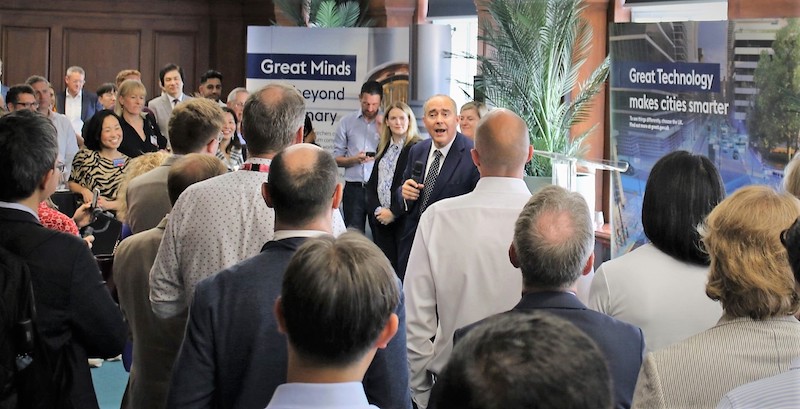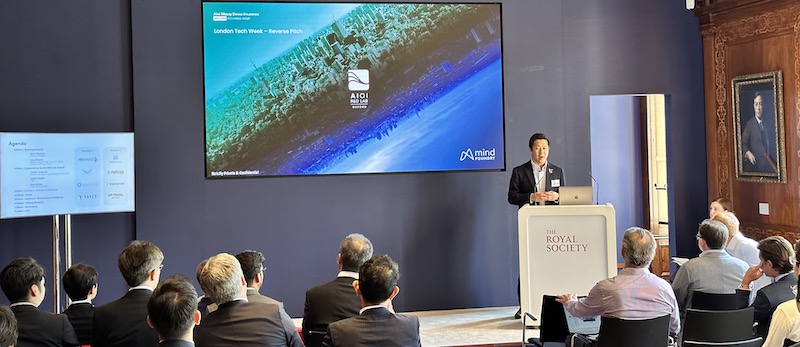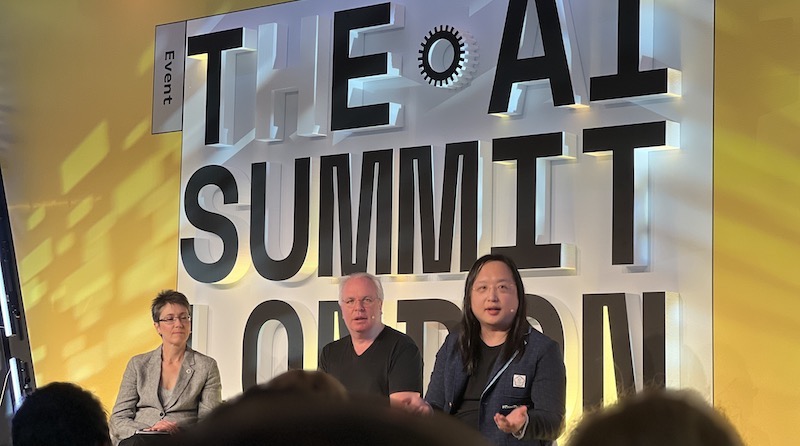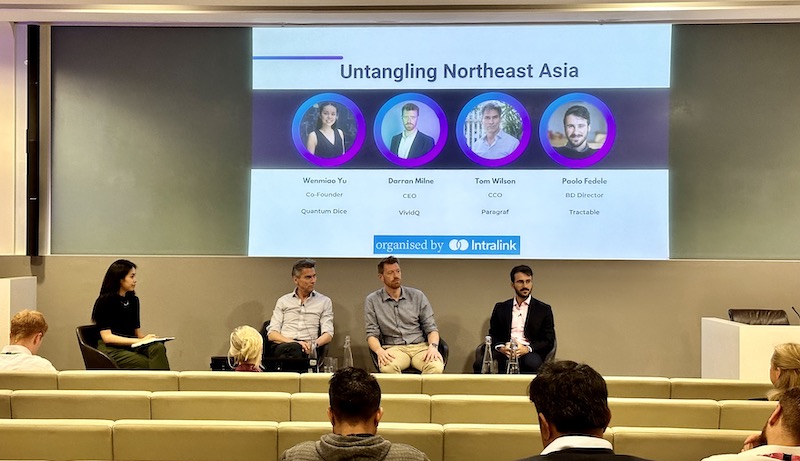Our COO, Jeremy Shaw, recounts London Tech Week’s inescapable signs that the UK’s tech sector is the one to watch; explains why, for many UK innovators, looking eastward is the way to kick start global success; and highlights how they can use subsidised services like the new UK-APAC Tech Growth Programme (which you can apply for right now!) to make that a reality.
With London Tech Week freshly behind us, I’m filled with confidence and optimism. The UK tech community is in a great position to harness the innovation and appetite for collaboration that was on display last week and turn it into a global success story.
Until recently, I lived and worked in some of the APAC region’s biggest business hubs – Tokyo, Hong Kong, Bangkok, Sydney – but as I rushed from one bustling event to another in London’s first heatwave this summer, I was impressed by the hundreds of UK startups and scaleups working to solve the world’s most pressing problems through technology.
I was delighted to see corporate delegations from across the world – particularly from Asia Pacific – looking to provide the investment firepower to scale these innovations. And encouraged to listen to government leaders pledging their support to make it happen.
But actually making it happen requires some work – and now the rousing speeches are over, it’s time to act.
Before we get to discussing all that, take a look at a 90-second London Tech Week montage our team has put together!
Technologies for a brighter future
The UK tech community and government leaders recognise that we’re on the cusp of something special.
PM Rishi Sunak’s keynote speech kicking off LTW made it clear that the UK is positioning itself as the centre of excellence in artificial intelligence research, development, field application and, equally importantly, thoughtful regulation.
In addition to AI, HM’s Trade Commissioner for APAC, Natalie Black, highlighted that the UK is leading the way in the development of quantum computing, clean energy (including fusion), healthtech, fintech and cybersecurity – all of which are poised to play a crucial role in building a better world.

It’s clear that the institutional support for the pipeline from university research to spin-out and commercialisation is getting stronger. And, as a result, the stable of British tech unicorns like Darktrace, Tractable, Revolut and Oxford Nanopore looks set to expand significantly in the coming years.
But success doesn’t come out of nowhere.
Technology breakthroughs happen in labs – and there’s no shortage of those in the UK. But making commercial breakthroughs is a different beast. Without capital, know-how and access to global markets, even the best inventions end up gathering dust.
Scaling up
Current economics and the aftermath of the pandemic have tightened the flow of VC funding. But while more traditional growth capital is harder to come by, corporate venture capital (CVC) has grown in the last few years.
Not only that, but M&A activity and corporates’ willingness to engage in joint development projects with startups and scaleups are on the rise – especially in Asia Pacific.
The path forward for many tech startups and scaleups in the UK, therefore, is to find what they need to grow – namely, investors, partners and customers – in APAC.
And it’s already happening.
At one LTW event, we watched eight exciting UK insurtech and climate-tech startups pitch to Aioi Nissay Dowa – one of Japan’s leading insurance groups that is investing significantly in the UK tech market. Aioi's ‘challenge’ was for the startups to demonstrate how they can apply new approaches to data analytics, AI and other sophisticated technologies to help prevent (and deal with) natural disasters, support ageing populations and build a healthier, happier, safer society.

My colleagues ran this event as part of the UK-APAC Tech Growth Programme (more on that shortly) and it was a resounding success – with all the participating firms now firmly on Aioi Nissay’s radar, and the winner expected to be crowned in the next week or two.
James Rendell, the CEO of BirdsEyeView Technologies, one of the participating startups, told me: “This was by far the best pitch event I’ve been to in terms of the quality of presenters and subject matter.”
That’s nice to hear. But, more importantly, we’re looking forward to making sure that words are followed by actions.
By the way: if you missed your chance to pitch this time, don’t worry – we will be organising many more events like this in the coming months. Stay tuned!

Finding partners in APAC
During London Tech Week, we supported several of our Asian clients’ delegations which flew into London to take part in events, meet prospective partners and scout for ‘the next big thing’.
In fact, overall, it was the biggest APAC delegation at LTW on record – with more than 600 investors and buyers visiting. And, having spent some time with them last week, I can say that what’s invariably on their minds is sustainability through smart technology.
For example, AI is a crucial component of sustainability tech. It’s central to healthtech and climate-tech. It also has a fundamental role to play in insurtech, fintech, battery-tech, semiconductors, EVs, ADAS and countless other fields. And that’s exactly what the likes of Toyota, Samsung, Mediatek, Petronas and Telstra are looking for.

So, if there’s demand for innovation from APAC’s corporates, and a growing supply from UK innovators, why aren’t we seeing more UK tech startups rise to fame and fortune through collaboration with some of the world’s largest brands?
The simple answer is because finding each other at the right time, in the right place is hard.
Challenges
At last Wednesday’s UK-APAC Tech Conference, organised by Deloitte, the Department for Business and Trade (DBT) and the Department for Science, Innovation and Technology (DSIT), we saw more than 200 people – government officials, industry leaders, venture capitalists and tech company founders – discuss the opportunities and challenges ahead in inter-regional cooperation.
While delegates and panellists spoke passionately about the undeniable opportunities for collaboration in and with ASEAN, Japan, Korea, Taiwan, Australia and New Zealand, the hurdles were debated as well.
Tom Wilson, the CCO of UK graphene startup Paragraf, said that growing your tech business in complex markets like Japan, Taiwan and Korea takes significant perseverance.
His co-panellists Darran Milne, CEO of XR startup VividQ, and Paolo Fedele, BD Director of unicorn Tractable, agreed – adding that plunging into Asian markets too early can be as perilous as going in too late.

While everyone concurred there is a whole spectrum of market entry approaches, it’s important above all to do your homework and to surround yourself with local advisors and partners who know the target market.
And this is especially true in deeptech – where you’re not merely putting products on shelves in Korea, Japan or Singapore, but forging long-term business relationships with Asian tech giants and commercialising your product globally alongside them.
So, how do UK firms take their cool new tech, find partners in APAC with whom to ‘go big’ and address the challenges of going international?
Subsidised programme for growth
Part of the answer lies in one of the most important initiatives the UK government announced during London Tech Week: the UK-APAC Tech Growth Programme. And we’re proud to have been appointed to deliver it.
In a nutshell, for the next few years, it will be our job to help eligible UK tech innovators find themselves exactly in the right place at the right time to sell into and collaborate with Asia Pacific’s largest players.
Along with our partners Orissa and Foley, we will be delivering this programme across 11 countries: Japan, Korea, Taiwan, Singapore, Vietnam, the Philippines, Malaysia, Indonesia, Thailand, Australia and New Zealand.
The programme is sector-agnostic but will favour technology for good. And it is tailored to organisations of all shapes and sizes, as long as they have significant growth potential.
If you want to commercialise your market-ready product in APAC, we will provide on-the-ground, bilingual teams to approach your customers on your behalf.
If you're looking to grow your network, initiate early-stage discussions or attract investors, we will organise in-country missions, roadshows and pitch events.
And if you're just getting started on your market expansion journey, we will hold skills workshops and coaching sessions.
If that’s not ‘actually doing it’, I don’t know what is.
We’re excited to have been selected for this programme. And we believe that – backed by our now-colleagues from the DBT and DSIT – it will become a driving force to help UK innovation to solidify its position globally through on-the-ground engagement with APAC’s largest tech companies.
We’ll be working with the UK’s most brilliant entrepreneurs, engineers and scientific minds to help them strike deals, generate revenues, secure investment and build their brand names in APAC.
And we’re confident the programme will succeed because we’ve been delivering growth for startups in APAC for decades! We’ve helped the likes of Ceres, Oxford Nanopore, Dyson, VNC Automotive, Paragraf, Owen Mumford, Goodfellow and countless others.
The only difference is now, if you’re an eligible UK scaleup, you can readily access our services with funding support from HM Government.
Time for action
So, London Tech Week gave us all a shot of excitement about the UK tech scene. It also marked the beginning of the UK-APAC Tech Growth Programme, whose first participants are embarking on their Asia Pacific journeys with us as we speak.
The opportunities in APAC are huge and the most common reason startups and scaleups choose not to take it – “We just don’t have the budget for it at the moment …” – can now be bypassed thanks to government funding.
The second most common reason people hesitate – “We just don’t know the market and lack the right connections …” – is no longer a problem either, thanks to our specialists who can act as your on-the-ground BD team in Asia Pacific.
We’re greatly looking forward to seeing the bold words we heard at London Tech Week now turn into concrete action.
To apply for the UK-APAC Tech Growth Programme, fill out the form on our website and we’ll get back to you shortly.
You can also follow the Tech Growth Programme on LinkedIn and Twitter to get the latest updates.